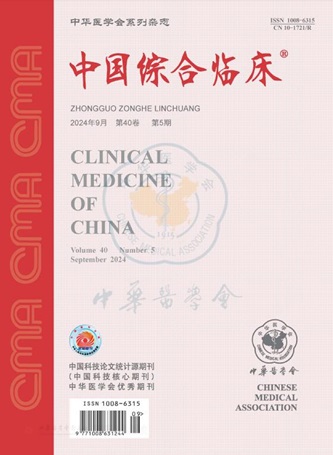Effect of serum high-sensitivity C-reactive protein and tumor necrosis factor-alpha on prognosis of patients undergoing percutaneous coronary intervention
引用次数: 0
Abstract
Objective To investigate the effects of serum high-sensitivity C-reactive protein (hs-CRP) and tumor necrosis factor-alpha (TNF-α) on the prognosis of patients undergoing percutaneous coronary intervention (PCI). Methods From January 2016 to December 2017, 197 patients with acute coronary syndrome (ACS) treated by PCI in our hospital were divided into MACE group (39 cases) and non-MACE group (158 cases) according to whether major adverse cardiovascular events (MACE) occurred after PCI.The serum levels of hs-CRP and TNF-α were compared between the two groups before and 48 hours after PCI.The risk factors of MACE after PCI were analyzed by logistic regression analysis. Results One year follow-up results after PCI showed that 39 of 197 ACS patients had MACE after PCI, with an incidence of 19.8% (39/197). There were 39 cases in MACE group and 158 cases in non-MACE group.The serum hs-CRP of the MACE group and the non-MACE group before PCI were (9.70±4.71), (7.50±4.61) mg/L respectively, and 48 hours after PCI were (15.37±5.01), (12.16±4.38) mg/L, respectively.There were significant differences between the two groups (all P<0.01). The serum TNF-α levels before PCI in MACE group and non-MACE group were (33.1±8.9), (25.7±8.0) ng/L, respectively, and 48 hours after PCI were (47.6±8.1), (32.4±7.6) ng/L, respectively.There were significant differences between the two groups (P<0.05 or P<0.01). The results of logistic regression analysis showed that preoperative serum hs CRP and TNF-α were the risk factors of mace in PCI patients (OR (95% CI) was 2.069 (1.715-3.358), 2.825 (1.614-4.372), P value was 0.020 and 0.027, respectively). Conclusion The serum levels of hs-CRP and TNF-α are related to the prognosis of patients with PCI.The serum levels of hs-CRP and TNF-α before PCI are risk factors for MACE, which can be used as independent predictors of MACE. Key words: Acute coronary syndrome; Percutaneous coronary intervention; Major adverse cardiovascular events; High-sensitivity C-reactive protein; Tumor necrosis factor-alpha血清高敏c反应蛋白和肿瘤坏死因子- α对经皮冠状动脉介入治疗患者预后的影响
目的探讨血清高敏c反应蛋白(hs-CRP)和肿瘤坏死因子-α (TNF-α)对经皮冠状动脉介入治疗(PCI)患者预后的影响。方法选取2016年1月~ 2017年12月我院行PCI治疗的急性冠脉综合征(ACS)患者197例,根据PCI术后是否发生重大不良心血管事件(MACE)分为MACE组(39例)和非MACE组(158例)。比较两组患者PCI治疗前及术后48 h血清hs-CRP、TNF-α水平。采用logistic回归分析PCI术后MACE发生的危险因素。结果197例ACS患者PCI术后1年随访结果显示,39例ACS患者PCI术后发生MACE,发生率为19.8%(39/197)。MACE组39例,非MACE组158例。PCI术前MACE组和非MACE组血清hs-CRP分别为(9.70±4.71)、(7.50±4.61)mg/L, PCI术后48 h hs-CRP分别为(15.37±5.01)、(12.16±4.38)mg/L。两组间比较差异均有统计学意义(P<0.01)。MACE组和非MACE组PCI术前血清TNF-α水平分别为(33.1±8.9)、(25.7±8.0)ng/L, PCI术后48 h血清TNF-α水平分别为(47.6±8.1)、(32.4±7.6)ng/L。两组间差异均有统计学意义(P<0.05或P<0.01)。logistic回归分析结果显示,术前血清hs CRP和TNF-α是PCI患者发生mace的危险因素(OR (95% CI)分别为2.069(1.715 ~ 3.358)、2.825 (1.614 ~ 4.372),P值分别为0.020和0.027)。结论血清hs-CRP、TNF-α水平与PCI患者预后有关。PCI术前血清hs-CRP、TNF-α水平是MACE的危险因素,可作为MACE的独立预测因子。关键词:急性冠脉综合征;经皮冠状动脉介入治疗;主要不良心血管事件;高敏c反应蛋白;肿瘤坏死因子
本文章由计算机程序翻译,如有差异,请以英文原文为准。
求助全文
约1分钟内获得全文
求助全文
来源期刊
CiteScore
0.10
自引率
0.00%
发文量
16855
期刊介绍:
Clinical Medicine of China is an academic journal organized by the Chinese Medical Association (CMA), which mainly publishes original research papers, reviews and commentaries in the field.
Clinical Medicine of China is a source journal of Peking University (2000 and 2004 editions), a core journal of Chinese science and technology, an academic journal of RCCSE China Core (Extended Edition), and has been published in Chemical Abstracts of the United States (CA), Abstracts Journal of Russia (AJ), Chinese Core Journals (Selection) Database, Chinese Science and Technology Materials Directory, Wanfang Database, China Academic Journal Database, JST Japan Science and Technology Agency Database (Japanese) (2018) and other databases.

 求助内容:
求助内容: 应助结果提醒方式:
应助结果提醒方式:


